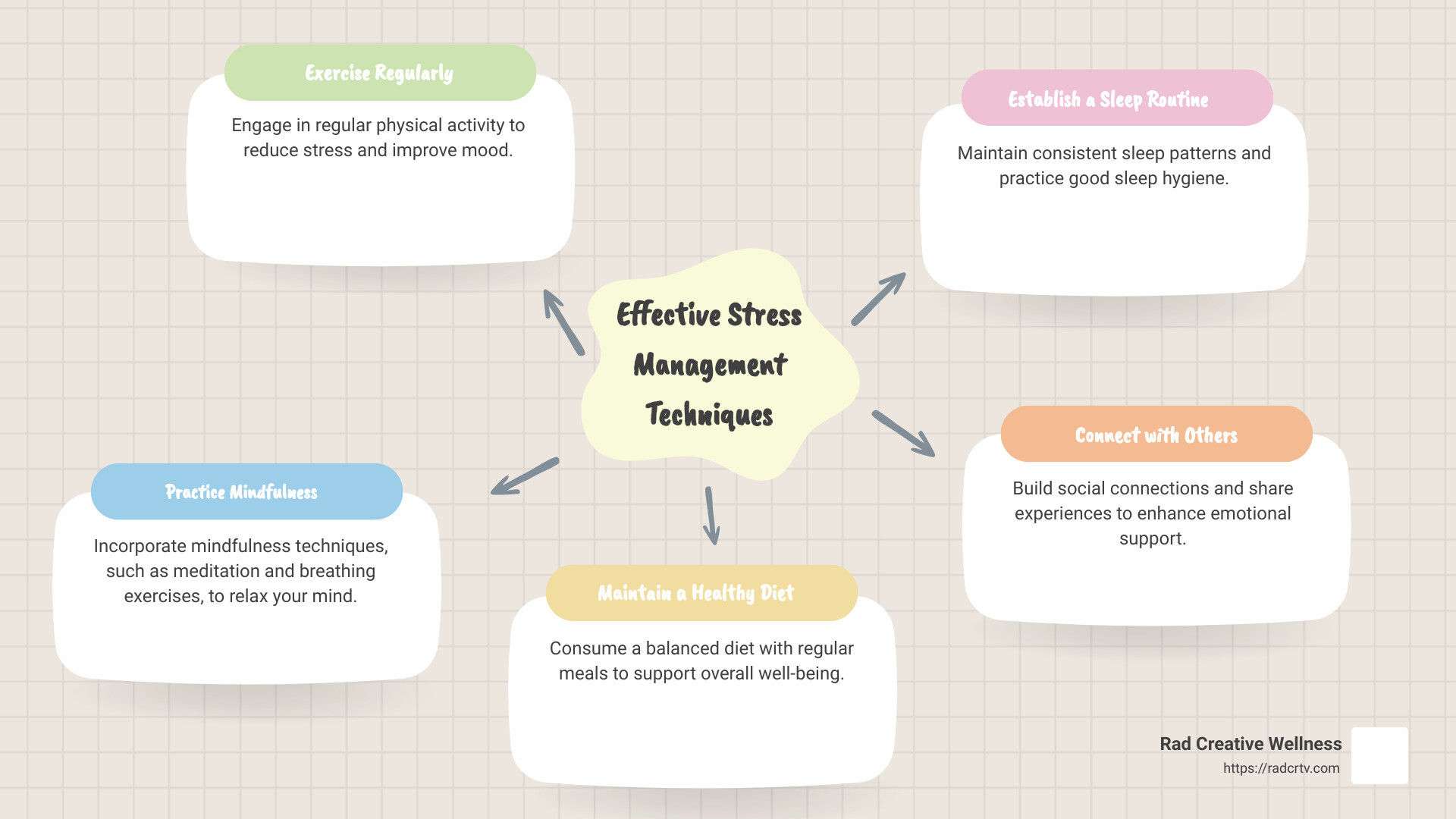
The Stress Guide: What It Is and How to Manage It
|
|
Time to read 8 min
|
|
Time to read 8 min
Stress is a common part of life, defined as a feeling of emotional or physical tension. It can arise from anything that frustrates or worries you. Stress can manifest as a natural reaction to challenging events, compelling us to respond quickly. While a little stress can be beneficial for motivation and survival, too much can lead to health issues. Here's a quick look at what stress involves:
I’m Robert Resz, and through my work at Radical Creative Wellness, I explore and present cutting-edge strategies for managing stress. With a background in wellness and biohacking, I provide insights into optimizing health and performance, focusing on how stress impacts individuals and how they can transform it for personal growth.
Stress is a natural reaction that everyone experiences. It's your body's way of responding to any demand or challenge. Think of stress as your internal alarm system, ready to spring into action when needed.
Stressors are events or thoughts that trigger stress. They can be anything from a looming deadline at work to an unexpected life change. Some stressors are positive, like the excitement of a new job, while others are negative, such as financial worries. What stresses one person may not affect another in the same way.
Acute stress is the most common form of stress. It's short-term and usually goes away quickly. Imagine you're skiing down a steep slope or narrowly avoiding a car accident. Your body reacts by releasing hormones that increase your heart rate and make you more alert. This type of stress can actually be beneficial, helping you manage immediate challenges and stay safe in dangerous situations.
Chronic stress, on the other hand, is a different story. This type of stress lasts for weeks or even months. It can stem from ongoing problems like a difficult job, an unhappy relationship, or financial troubles. Unlike acute stress, chronic stress can have serious implications for your health. It keeps your body in a constant state of alert, which can lead to issues like high blood pressure, heart disease, and depression.
Understanding the different types of stress and how they affect you is the first step in managing them effectively. It's about recognizing the stressors in your life and learning how to respond to them in a healthy way.
Next, we'll explore how stress impacts both your body and mind, and what you can do to mitigate its effects.
Stress affects both your body and mind, often in ways you might not immediately notice. Understanding these effects can help you take steps to manage stress effectively.
When you're stressed, your body goes on high alert. This can lead to a variety of physical symptoms. Common signs include headaches, muscle tension, and chest pain. You might also experience fatigue or have trouble sleeping. Stress can even upset your stomach and weaken your immune system, making you more prone to illnesses.
Chronic stress, in particular, keeps your body in a constant state of alert. Over time, this can contribute to serious health problems like high blood pressure, heart disease, and diabetes. According to the American Psychological Association, unmanaged stress can also lead to obesity due to stress-related eating habits.
Stress doesn't just affect your body; it impacts your mind, too. It can cause feelings of anxiety, restlessness, and sadness. You might find it hard to concentrate or feel overwhelmed by simple tasks. Persistent stress can also lead to depression or memory problems.
In some cases, stress can trigger emotional responses like anger or grumpiness. You might notice changes in your behavior, such as overeating or using alcohol and tobacco more frequently. These habits can create a cycle that worsens your stress and its effects.
Chronic stress is particularly harmful. It can affect your mood, making you feel more irritable or withdrawn. Over time, it can also change your behavior, leading you to avoid social situations or neglect your exercise routine. This type of stress can have a lasting impact on your mental health, increasing the risk of long-term conditions like depression and anxiety disorders.
Moreover, chronic stress can exacerbate existing health issues and make it harder for your body to recover from illnesses. It's crucial to recognize the signs of chronic stress early and take action to manage it.
Understanding the effects of stress on your body and mind is essential to finding effective ways to cope. In the next section, we’ll dive into practical techniques you can use to manage stress and improve your well-being.
Managing stress is vital for keeping your body and mind healthy. Here are some proven techniques to help you stay balanced and calm.
Exercise is a powerful stress reliever. When you move your body, it releases endorphins, which are chemicals that make you feel good. Regular physical activity, like walking, jogging, or yoga, can help reduce stress and improve your mood. According to the World Health Organization, even a short daily walk can make a big difference.
Good sleep is crucial for managing stress. Poor sleep can make you feel more stressed, and stress can make it hard to sleep—a vicious cycle! To improve your sleep hygiene, try to go to bed and wake up at the same time every day. Keep your bedroom dark and quiet, and avoid screens before bed. These habits help your body relax and prepare for sleep.
What you eat affects how you feel. A balanced diet with plenty of fruits and vegetables can help your body handle stress better. Avoid too much caffeine and sugar, as they can increase feelings of anxiety. Drinking enough water is also important. Staying hydrated keeps your body and mind working well.
Mindfulness is about being present in the moment. Techniques like deep breathing, meditation, or simply taking a few minutes to focus on your senses can reduce stress. Mindfulness helps you calm your mind and gain perspective. Consider trying guided meditation or breathing exercises to get started.
Connecting with others is a natural stress reliever. Talking to friends or family about your worries can lighten your load. Social support provides comfort and helps you feel less alone. Make time to chat with loved ones, whether in person or over the phone. These connections are important for emotional well-being.
Using these techniques can help you manage stress more effectively. In the next section, we'll explore the top five stress management strategies to further support your mental and physical health.
Physical activity is one of the best ways to reduce stress. When you exercise, your body releases endorphins, which are like natural mood boosters. Whether it's a brisk walk, a dance class, or a workout at the gym, regular movement can help keep stress at bay. According to research, even simple activities like walking or stretching can make a big difference in how you feel each day.
Mindfulness involves focusing on the present moment and letting go of distractions. Techniques like meditation, deep breathing, and guided imagery can help calm your mind. These practices teach you to relax and manage stress better. Try taking a few minutes each day to sit quietly and pay attention to your breath or the sounds around you.
Eating a balanced diet is crucial for managing stress. Regular meals with a variety of fruits, vegetables, whole grains, and lean proteins support your body and mind. Avoid excessive caffeine and sugar, as they can increase anxiety. Staying hydrated by drinking enough water also helps your body function smoothly.
Consistent sleep is essential for stress management. Good sleep habits, also known as sleep hygiene, can improve the quality of your rest. Go to bed and wake up at the same time every day, even on weekends. Keep your bedroom dark and quiet, and avoid screens before bedtime. These practices help your body relax and prepare for a restful night.
Social support is a powerful tool for reducing stress. Sharing your thoughts and feelings with trusted friends or family members can provide comfort and perspective. Make time to connect with loved ones, whether through a phone call, a video chat, or a face-to-face meeting. These interactions can help you feel supported and less alone.
By incorporating these strategies into your daily routine, you can manage stress more effectively. Up next, we'll answer some frequently asked questions about stress to deepen your understanding and help you steer life's challenges.
Stress is the body's reaction to any change that requires an adjustment or response. It can be emotional tension or physical tension. When you feel stressed, your body is responding to a challenge or demand. This can be anything from taking a test to dealing with a family conflict. Stress is a natural part of life and can be both positive and negative. It helps you stay alert and motivated, but too much stress can take a toll on your health.
Handling stress involves using strategies to manage emotional and physical tension. Here are some tips:
Exercise Regularly: Physical activity releases endorphins, which improve your mood and reduce stress.
Practice Mindfulness: Techniques like meditation and deep breathing help calm your mind and focus on the present.
Maintain a Healthy Diet: Eating balanced meals keeps your body strong and ready to handle stress.
Establish a Sleep Routine: Consistent sleep helps your body recover and manage stress better.
Connect with Others: Talking with friends or family can provide support and reduce feelings of isolation.
Trying different coping strategies can help you find what works best for you. It’s okay to seek help from a healthcare provider if stress becomes overwhelming.
Stress can lead to various health problems if not managed well. Common physical symptoms include:
Headaches: Tension in your head or neck can cause pain.
Muscle Tension or Pain: Stress can make your muscles feel tight or sore.
Stomach Upset: You might experience nausea or digestive issues.
Sleep Problems: Stress can make it hard to fall or stay asleep.
Chronic stress can contribute to more serious health issues like heart disease, diabetes, and obesity. It can also affect your mood, leading to anxiety or depression. Recognizing these symptoms early can help you take action to manage stress effectively.
At Rad Creative Wellness, we believe that managing stress is not just about reducing tension, but about changing it into an opportunity for growth. Our innovative approach combines scientific wellness practices with creative strategies to help you steer stress effectively.
Stress is a natural part of life, but it doesn't have to control us. By understanding our individual stressors and responses, we can harness stress to improve our well-being. This involves finding the balance between engagement and recovery, much like athletes do in training.
Creative approaches to stress management can make a big difference. Whether it's through mindfulness techniques, connecting with others, or maintaining a healthy lifestyle, these strategies can help you manage stress in a way that fits your unique journey.
We provide a variety of resources to support your wellness journey. From exercise tips to dietary advice, our goal is to empower you with the tools you need to manage stress effectively. Explore our wellness collection for more insights and products designed to help you thrive.
Stress management is an ongoing process. By integrating creative and science-based approaches, you can not only cope with stress but also use it as a stepping stone to personal growth and resilience. Let's accept the journey together and transform stress into a powerful ally in our lives.

